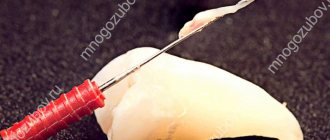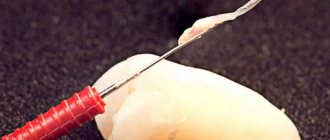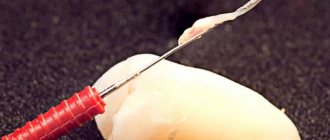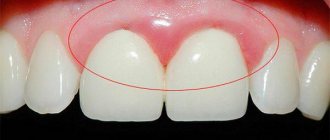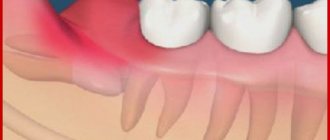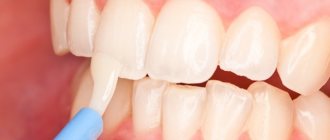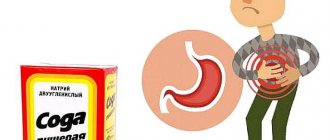Every day people go to the dentist with aching pain in the elements of the dental system. The syndrome can develop due to damage to enamel, dentin, and pulp. Based on the nature of the localization, pain sensations can be pulsating, aching, shooting in nature, temporary or long-lasting. Most often, pain is observed in the evening and at night. In this case, you must immediately contact a specialized specialist for diagnosis and prescribing appropriate therapy, followed by removal of the tooth nerve. Self-treatment at home can aggravate the situation and contribute to the development of serious complications.
Dental nerve - what is it?
In fact, the nerve in the tooth is the pulp. It is surrounded by dentin, which covers the enamel on top. This part of the tooth is responsible for nourishing all other tissues, as well as for sensory perception. Therefore, after its removal, the crown usually fades, acquires a grayish tint, and becomes fragile and brittle. Such a tooth is called dead.
The pulp is a bundle of blood vessels and nerves of the tooth.
As soon as carious processes penetrate deeper into the dentin and reach the pulp, the person begins to experience severe piercing pain. In this case, doctors usually make a diagnosis of pulpitis. But this disease can also be traumatic. With a strong blow, the pulp is damaged and becomes inflamed. If treatment is not started in time, the nerve will have to be partially or even completely amputated. This is necessary to prevent further spread of the inflammatory process and the development of complications, including periodontitis.
Toothache: causes
Under the dental crown in the canals there is a network of blood vessels and nerve fibers.
In this way, the tooth is connected with the rest of the body - its circulatory and nervous systems. The appearance of toothache indicates that the pathological process has reached the nerve, which signals a problem. As you know, pain is only a symptom, the causes of which still need to be known. Therefore, if the dental nerve hurts, then the right solution would be to go to the dentist. Often, when examined by a doctor, one of the following causes of toothache is determined:
- Caries . This is the most common reason for nerve pain. Pathogenic bacteria that inhabit the oral cavity produce lactic acid during their life, which corrodes the enamel. In the initial stages, caries does not cause pain. However, as the enamel is destroyed, the pathological process gets closer to the nerve. If pain occurs during caries, then this indicates an advanced process.
- Pulpitis . This is an inflammation of the internal tissues of the tooth. In fact, pulpitis is an advanced form of caries, when bacteria have eaten away the hard tissues of the tooth and reached the soft ones. The initial stages of pulpitis are characterized by acute pain, which may subside over time. The disappearance of pain indicates that the nerve is killed.
- Periodontitis . This is an inflammatory pathology of periodontal tissues. A characteristic symptom of periodontitis is bleeding gums and tooth mobility. Sometimes a person is bothered by pain. This problem requires treatment by a periodontist.
- Periostitis (flux) . This is a purulent lesion of the periosteum, often accompanied by severe throbbing pain.
- Dental hyperesthesia . This is increased tooth sensitivity that occurs when eating cold, hot or sour foods, as well as when inhaling cold air. There are several reasons for hyperesthesia. These are caries, increased wear of tooth enamel, as well as dental trauma and other reasons.
The dental nerve is also irritated under other diseases and circumstances, for example, with gingivitis, periodontitis, improper filling, and also after tooth extraction.
In what cases is nerve removal indicated?
With pulpitis, the causative tooth reacts sharply to any mechanical and temperature stimuli. If the neurovascular bundle is already severely damaged, there is no point in trying to stop the inflammatory process, because the risk of relapse is too high. In such a situation, the doctor prescribes removal of the nerve - depulpation. Thus, among the main indications for this procedure, experts in the field of endodontics identify the following pathological conditions:
- advanced caries and pulpitis: when the lesion destroys enamel and dentin and reaches the pulp, it is necessary to either urgently stop the inflammation or remove the affected tissue. The first option is possible only in the early stages of pulpitis, but in practice it is more often necessary to partially or completely amputate the neurovascular bundle,
- complication after unsuccessful treatment in dentistry: in the process of preparing a too large carious cavity, there is always a risk of accidentally injuring the pulp. In such a situation, to correct the error, you also have to remove it partially or completely,
- prosthetics: to install fixed bridges and dentures, it may be necessary to depulpate the abutment teeth,
- mechanical injuries: the pulp can be damaged and inflamed also due to a strong blow. Large chips and cracks in the enamel often lead to similar consequences.
Removal of the nerve is indicated in the treatment of pulpitis
“They removed the nerve from my tooth, but that was a long time ago. Back then, a special medicine was put inside, and something like a temporary filling was placed on top. After 3-4 days you come back for an appointment, and the doctor is already pulling out the dead nerve. I remember while I was waiting for the next appointment, it was unpleasant, the tooth hurt, but it seemed like it should be. I heard that now this procedure is easier, they can do everything in one visit.”
Maxim_Volt, from correspondence on the forum www.32top.ru
Piercing pain in the tooth, which becomes especially unbearable at night, most often indicates the development of pulpitis. However, when the pathological process becomes chronic, acute symptoms may disappear completely. In this case, only a professional doctor can make a correct diagnosis in time. This is one of the reasons why it is so important to have a routine dental checkup every six months.
Why remove nerve endings?
Under the crown of the tooth there are nerve endings. They spread through the canals and reach the tooth roots. Nerves provide unity between the dental system and the central nervous system. They have their own sensory function. Pain in a tooth is a signal that indicates that the soft layers under the crown have undergone destruction.
As a result of depulpation (this is the removal of a bundle of nerves in the tooth canal), the pain goes away. After this procedure, the nutrition of the tooth ends. Subsequently, you will just need to monitor the crown and visit the dentist regularly. If you do not do this, the tooth will turn black and decay.
It is possible to save a nerve if a person asked for help in time, and did not look for an answer to the question of how to properly kill a dental nerve, and did not try a lot of different remedies on himself. Even if partial damage to the pulp has occurred, there is still a chance to neutralize the area without removing the pulp.
If you regularly visit a specialist, you may never encounter such problems.
How to kill the pulp in dentistry
As for how to kill a nerve in dentistry, specialists for this purpose use two methods of depulpation - vital and devital. The first option involves amputation of the inflamed vascular bundle in one visit, under anesthesia. With the devitalizing method, the removal is carried out in two steps: at the first appointment, the doctor puts a devitalizing paste into the tooth and places a temporary filling on top, and at the second, he amputates the already dead pulp.
Quite aggressive arsenic compounds are used for killing. But today they are gradually being replaced by less toxic formaldehyde pastes. Below we will take a closer look at exactly what medications are used to kill the nerve.
Devitalizing pastes with arsenic: “Devit-Ars” and “Kaustinerv Rapid”
The basis of the drug "Devit-Ars" is arsenic anhydride. It leads to the gradual death of soft tissues and fairly rapid death of the pulp. To make this process painless for the patient, the composition also contains lidocaine.
The photo shows arsenic paste
It should be noted that the process of necrosis of living tissue requires strict control by a doctor, otherwise the consequences for the body can be very serious. It is very important to provide reliable protection against infection during this time. For this purpose, antiseptics are also added to the Devit-Ars paste - eugenol, chlorophenol and metacresol. As a rule, killing with this drug occurs literally within 24 hours1. In rare cases, the process takes a little longer, but usually no more than 2 days.
"Caustinerv Rapid" is another popular devitalizing drug in dentistry based on the same active substance. The composition also contains lidocaine, phenol, hydrochloric ephedrine and menthol. The devitalization process takes on average 2-3 days.
Arsenic-free pastes - formaldehyde
One of the most popular drugs in this category is Devit. It is based on paraformaldehyde, the action of which is aimed simultaneously at killing the pulp and antiseptic treatment of tissues. Lidocaine acts as an anesthetic component, and creosote is responsible for the antimicrobial properties.
Paste without the presence of arsenic can be used
To perform its immediate task, this formaldehyde paste requires much more time - up to 10 days. On the other hand, this is a much more gentle and safe method that poses virtually no threat to the body. Another important advantage of this type of devitalizing agents is the deep sterilization of the pulp chamber, which often makes it possible to preserve tissue at least partially.
Important! After arsenic paste, the doctor must carry out a very thorough treatment of the canals and make sure that there are no traces of a toxic substance there. When using formaldehyde compounds, this step can be skipped.
After 2 to 10 days, depending on the type of composition used, the patient needs to visit the doctor again to complete the treatment. He will remove the temporary filling, remove dead tissue, treat the canals and seal them. A permanent filling will be placed on top and sent for a control x-ray.
Answer-question section
Is it painful to perform depulpation?
In dentistry, powerful local anesthetics are used that completely block discomfort during the intervention. Severe pain may be felt if the drug is not suitable for the patient or was administered in the wrong dosage. Without pain relief, the process of treating a carious cavity is very painful.
Why do gums hurt after depulpation?
During the procedure, nerve endings are damaged. Because of this, pain persists for 2-3 days after the intervention. If the doctor performed all the manipulations correctly, the intensity of discomfort decreases, as a rule, by 2-3 days.
Is it possible to perform the procedure for free?
In public medical institutions, the procedure for removing the dental nerve is provided free of charge under the compulsory medical insurance policy. A separate additional payment for the administration of pain medication is possible.
How to relieve pain at home yourself
It is worth taking a closer look at the question of how you can calm the nerve yourself before visiting a specialist. You need to understand that such remedies are only needed to mask the symptoms, but they will not help to quickly kill the pulp and relieve you of pain forever. Therefore, you will have to visit the dentist in any case. And if it is not possible to do this urgently, the following traditional medicine recipes will help to relieve the pain and discomfort a little:
- Soda-salt solution is one of the most popular and effective home remedies for relieving acute toothache. A teaspoon of salt and soda should be diluted in a glass of boiled water at room temperature and then used for rinsing the mouth,
You can use a solution of soda and salt - a solution based on 3% hydrogen peroxide also helps reduce the intensity of discomfort. Peroxide should be diluted in warm water in a ratio of 2 to 1, then soak a cotton swab in the resulting solution and apply it to the sore tooth,
- onion peels will help reduce pain and disinfect tissues. To do this, pour 500 ml of boiling water over a small handful of husks and leave for a while on low heat. Strain the finished broth, let it sit for 2-3 hours and then use it for rinsing,
- a mixture of garlic and salt will help reduce inflammation somewhat. To do this, it is placed in an open carious cavity,
- Clove essential oil has pronounced antiseptic and anti-inflammatory properties. It is enough to drop a couple of drops on a cotton swab and cover the painful area with it,
- herbal decoctions of chamomile, mint, lemon balm, thyme, sage and oak bark. You can prepare a decoction of herbal tea or use one type of dried flower.
Herbal decoctions can be used at home
Remember that any attempts to kill the exposed nerve yourself will only lead to a worsening of the condition and the development of dangerous complications. If your tooth hurts badly, try to see a specialist as soon as possible.
Preparation before home depulpation
At home, you can kill the nerve of the tooth or reduce its sensitivity. In the first case, you will have to destroy the crown part of the tooth to get to the problem area.
Before suppressing the sensitivity of the structure, the following preparatory measures are performed:
- Decide whether it is necessary to kill the dental nerve or reduce its susceptibility to external irritants. The method of relief will depend on the intensity of the pain and the qualifications of the person who will carry out emergency measures.
- Treatment of the oral cavity with antiseptics.
- Cleaning the canals with a needle. It is preheated over a fire and treated with disinfectants, for example, Miramistin or Chlorophyllipt.
- Repeated antiseptic treatment of the mouth.
Is it possible to kill a nerve yourself using traditional methods?
Many people are interested in the question of whether it is possible to kill the pulp on their own at home and what folk remedies are best to use for this. The answer will be categorical: such serious dental procedures should be performed by a professional doctor, and nothing else. Otherwise, you risk only aggravating the situation and provoking the development of serious complications.
Therefore, below, for informational purposes only, are the old methods that were previously popularly used to kill a tooth. Here's what they used to kill the nerve, except for arsenic:
- vinegar - moisten a piece of cotton wool in vinegar essence and apply to the causative tooth. Great care should be taken as the essence quickly corrodes enamel and dentin,
- gunpowder - place the substance into the carious cavity, but under no circumstances swallow it, as this can lead to serious poisoning,
- iodine – moisten a piece of cotton wool with iodine and apply it to the hole. You just have to prepare for the fact that it will hurt very, very badly,
Iodine is also used in folk medicine - zinc - burn a piece of newspaper with black ink, collect the ashes on a cotton swab and place it as close to the nerve as possible, leaving it there for about 12 hours,
- arsenic - place a pea of a toxic substance into a cavity in a tooth. It is very easy to fail to calculate the dosage, which can result in serious poisoning of the body and even death.
Under no circumstances should you try to use these methods on yourself. Contact your dentist and undergo the appropriate procedure under the supervision of an experienced specialist. Independent attempts are fraught with dangerous complications.
Cardinal methods
If rinsing and lotions do not help, then how can you kill the dental nerve at home? There are several drastic methods, but they can cause serious harm, so they are recommended to be used only in difficult cases and with extreme caution. Here are a few remedies:
- Vinegar essence. You need to moisten a cotton swab in it and place it carefully in the hollow of the tooth. But initially you need to thoroughly disinfect your hands to prevent infection. The procedure must be carried out carefully so as not to burn the gums.
- Alcohol. If rinsing with alcohol tinctures does not give any results, then you can moisten a cotton swab in medical alcohol and place it in the hollow of the tooth.
- Zinc. Not everyone has this substance in their home, but you can extract it yourself from printing ink. You need to take a sheet of newspaper with a large black design, crumple it up and set it on fire. Use a cotton swab moistened with human saliva to collect the ashes and place them in the tooth. This procedure is painful, so it is recommended to take a painkiller 20 minutes before the procedure.
Whatever method is used at home, you need to remember that this is a temporary measure; a visit to the dentist should still be necessary.
What complications can there be from home methods?
Even a doctor during depulpation can make a mistake that will lead to undesirable consequences. What can we say about independent attempts to kill the pulp at home, without following any rules of asepsis and antiseptics. Among the possible negative consequences of such arrogance, experts note nerve separation, severe hemorrhage due to vascular injury, as well as the spread of inflammation to nearby tissues. Other possible problems include:
- allergic reaction to the substances used,
- injury to healthy tissues,
- burn of the mucous membrane,
- loss of taste sensitivity,
- infection and sepsis.
When using home methods, a burn may occur.
Most often, after trying to kill the pulp on their own using traditional methods, patients are faced with a severe burn of the mucous membrane. In other cases, the pulp is burned with preservation but serious damage to the nerve.
Medications
You can kill the nerve in a tooth at home using pharmaceutical medications. To do this, you can use special dental pastes that do not contain arsenic. These include “Devit-P” and “Devit-S”. You need to brush your teeth well, clean the canals from food debris and put a pea of paste in the hollow, fix it with dental glue recommended for fixing dentures. All this can be easily purchased at any pharmacy, and it is safe for health.
When choosing pharmaceutical products that kill the dental nerve, you need to remember that some of them may contain arsenic, which can be harmful to health if used incorrectly. It is better to immediately check the composition of the drug with a pharmacist or read the instructions for it.
What is strictly forbidden to do
There are also several strict restrictions and prohibitions that must be observed to avoid unwanted consequences. Here are the main ones:
- you can’t heat the causal area - no hot compresses, which only intensify the pain and provoke the spread of inflammation,
- you should not take a horizontal position - this will increase blood flow to the painful area, which will make the unpleasant sensations even more intense,
- Under no circumstances should you use needles - some try to pick out the cavity themselves, but this is strictly prohibited. Otherwise, you can provoke severe bleeding and even infection.
In no case should you attach a heating pad to an inflamed nerve.
Killing and removing a nerve from a tooth, even in dentistry, is considered a serious procedure that requires the proper experience and dexterity from a specialist. Therefore, in case of inflammation of the pulp, the help of a qualified specialist – an endodontist – is required. This is not a case where you can do it on your own. Don't risk your health.
1According to information at the office. manufacturer's website: vladmiva.ru.
Manifestations and causes of nerve inflammation
You can determine that the nerve of a tooth is inflamed by several signs:
- Increased pain when turning or tilting the head. The pain spreads to several teeth at once; it is difficult to determine which one hurts.
- Constant discomfort in the neck and temple area.
- An inflamed nerve quickly reacts to any irritant: hot and cold water, the same reaction can be expected from sweets.
Only a dentist can determine exactly what the reason is and choose the best medicine that kills the dental nerve.
Procedure
- Grasp the tooth, cover it with a sterile bandage, and pull. Keep shaking it. You can use forceps, pliers, tweezers.
- Do not squeeze the tooth too hard to prevent it from cracking.
- From time to time, try to pull it firmly, but without jerking, so as not to break off part of the root and cause an inflammatory process.
- Act smoothly, rocking the tooth and periodically trying to pull it out. Jerking is unacceptable, as you can damage the gum or break the root. Then it is no longer possible to do without the help of a surgeon.
After successful extraction:
- Place a sterile swab on the hole for half an hour.
- Remove it without disturbing the formed clot.
- Do not eat for three hours.
- Monitor the condition of the gums in the injured area, rinse your mouth with vodka, potassium permanganate solution, hydrogen peroxide or other disinfectant.
- You can use a decoction of oak bark to speed up healing and reduce pain.
To remove a tooth root you need to prepare:
- Spitting container;
- Antiseptics;
- Pain reliever;
- Gauze Swabs and pads;
- Mirror.
These tips should not be resorted to if it is possible to turn to a professional, since root extraction is a rather serious and risky operation.
The best treatment is prevention
Many patients are interested in whether it is possible to get a cold in their teeth if nothing bad has happened before under the same circumstances? It is possible if you have caries, but you did not cure it in time, and as a result, due to hypothermia, inflammation begins and the nerve hurts greatly. From this it becomes clear that it was caries that served as the root cause of subsequent inflammation, and if it had been cured, then a walk in the cold would not have brought any unpleasant surprises.
Pay closer attention to the health of your teeth, brush them thoroughly twice a day and do not forget to use dental floss and mouthwash. All these measures will help you avoid caries and visit the dentist less often, limiting yourself only to routine examinations.
It is important to take care of your health and choose the right clothes based on weather conditions. Severe hypothermia can cause serious illness.
Here are some simple tips to prevent colds in your teeth or facial nerve:
- Dress according to the weather; if it’s winter, don’t forget about warm clothes. Take care of gloves, a scarf and a warm hat, even if you leave the car for a short time. Sometimes a short stay in the cold wind is enough and a visit to the dentist becomes inevitable;
- Do not ignore even small manifestations of caries; a few unpleasant minutes in the dental chair are better than excruciating, incessant pain from a cold nerve. Do not skip preventive examinations with your doctor;
- A responsible attitude to oral hygiene can save you from many possible dental problems and save a lot of money on dental services;
- You can also get inflammation of the dental nerve in the summer when you are in a strong draft, near a working air conditioner or in a cold wind.
Do not forget that sometimes you need to have your teeth professionally cleaned to remove plaque and tartar, which can cause caries.
How do dentists remove a nerve?
Just 20 years ago, it was not possible to perform the nerve removal procedure in a doctor’s office in one go. But today, thanks to effective anesthetic agents, everything is possible. Initially, the doctor will numb the tooth, then clean the canal to get to the pulp. He will remove it and install a temporary filling. Only at the next visit, which may be scheduled in a few days, will the doctor be able to place a permanent filling, making sure that the removal of the nerve endings was completed correctly and without complications.
In addition to removing the pulp, the doctor may recommend partially removing the nerve, but he can make such a decision if the patient is a teenager or a child; in adult patients, the nerve is completely removed.
There is nothing difficult for a specialist in this procedure; immediately after the injection the patient feels relief, and after removal of the nerves the pain does not return. To prevent this condition, it is better to seek help immediately after discomfort appears in the tooth or a hole is discovered.
Possible complications after depulpation
After the procedure, you may experience:
- Canal bleeding. The main reason for this phenomenon is the separation of the pulp by the pulp extractor. To avoid this problem, dentists practice gradual cutting of soft tissue using files and copious rinsing with an antiseptic. Only a doctor can stop canal bleeding.
- Short-term pain. Their duration may vary, but if they do not go away for a long time, it is necessary to re-open the canals and disinfect them.
- The appearance of a cyst, granuloma, gumboil or fistula.
- Facial paralysis. May occur due to improper application of material. If it protrudes beyond the upper part of the root, it will not only affect the tooth, but also compress the nerve of the jaw. That is why if you have pain in the chin area, you should immediately consult a dentist.
If disinfection is of poor quality during pulp removal, there is a risk of suppuration and the development of periodontal abscess. In this case, tooth extraction cannot be avoided.
